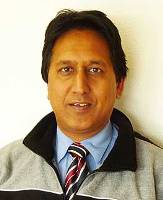Jan 25 2011
The Assisted Aged Care Technology Workshop was held on January 18, while the International Colloquium on Medical Robots took place on January 19, 2011, at the Wellington campus.
Participants formed working committees to discuss basic standards that are essential components in the care, security and performance of medical robotics. According to Professor Gurvinder Virk from the School of Engineering and Advanced Technology who organized the workshops, at present there exists “considerable global activity” in the field of non-industrial robotics. Personal care for the aged and disabled, and other medical applications are the main focus in developing what are termed service robots.
 Gurvinder
Gurvinder
The first workshop focused on how to provide safe, independent and assisted living environments for aged persons, especially those located in New Zealand. This workshop was conducted in collaboration with the nursing program of the School of Health and Social Services in New Zealand. It helped researchers who had products like mopeds or scooters for those confined to wheel chairs and nurses caring for the elderly, together on a single platform to explore ways in which they could possibly work together.
Experts and producers of medical robots from across the world shared updated information at the second workshop on the way technology is utilized and marketed. Specialists from Germany, the United States, Korea, China and Japan made presentations on how robots are deployed in the medical sector in each of the countries represented. Some physicians also gave valuable insight into medical robotics from a physician’s perspective.
Milan Bates, an associate specialist in cardiothoracic surgery at the University Hospital in Bristol, UK, presented a surgeon’s ideas. Carol Herman from the Food and Drug Administration in the US spoke about regulations relating to medical devices such as robots, while Professor Seungbin Moon from Sejong University, Korea, spoke on present day standardization of robotic applications on a global scale.
The International Organization for Standardization technical committees on medical robots, personal care robots and service robots were also represented, and will make use of the coming week in Wellington finalizing international standards that will govern future robotic developments.